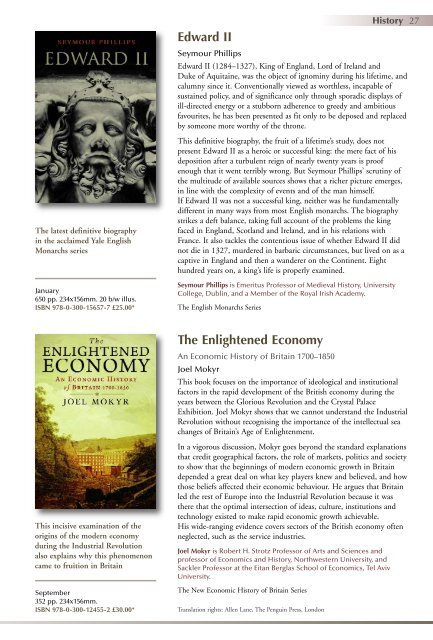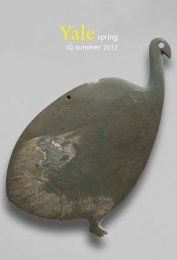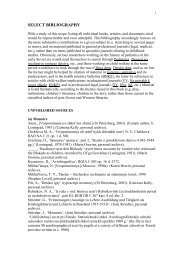26 PaperbacksThe Discovery of MankindAtlantic Encounters in the Age of ColumbusDavid AbulafiaEmphasising contact between peoples rather than the discovery of lands, and using archaeologicalfindings as well as eyewitness accounts, David Abulafia explores the social lives of the New Worldinhabitants, the motivations and tensions of the first transactions with Europeans and the swifttransmutation of wonder to vicious exploitation. Lucid, readable and scrupulously researched, this isa work of humane engagement with a period in which a tragically violent standard was set forEuropean conquest across the world.“This is a fine book, a rare combination of careful scholarship and story-telling ability thatbreathes vivid life into the events of five centuries past. It is also a salutary reminder that thediscovery of mankind is a process not yet complete.”—Kevin Rushby, The Guardian“This book is a wonderful work of scholarship. While it vividly conveys the European fascination, confusion and puzzlementwith the peoples of the Canary Islands, the Caribbean and north east Brazil, soberly it records the violence and changingattitudes which followed, as the early years of cross-cultural contact were overtaken by the harsh reality of conquest andenslavement.”—John Appleby, BBC History MagazineDavid Abulafia is Professor of Mediterranean History at Gonville and Caius College, <strong>University</strong> of Cambridge.September 408 pp. 234x156mm. 30 b/w illus. Paper ISBN 978-0-300-15821-2 £16.00*Translation rights: A.M. Heath & Co, LondonShopping in the RenaissanceConsumer Cultures in Italy, 1400–1600Evelyn WelchThis fascinating and original book breaks new ground in the area of Renaissance material culture,focusing on the marketplace and such related topics as middle-class to courtly consumption, theprovision of foodstuffs and the acquisition of antiquities and holy relics.“To reconstruct the activity of shopping in the Renaissance, Welch deploys an extraordinarily widerange of material . . . Her valuable book offers the reader an acute insight into the origins of ourpresent-day consumer culture.”—RA Magazine“outstanding . . . written with such a pace that you’re hooked before you have a chance to feelscared by the scholarship.”—Kathryn Hughes, The Guardian“the real delight of this work lies in its attention to the details of everyday life . . . Like a thrifty housewife making over a dresswith fragments of rich velvet, the reader can piece together from these anecdotes a vivid portrait of a society with anirrepressible eye for a bargain.”—Sally Korman, The Art NewspaperWinner of the Wolfson Foundation History Prize 2005Evelyn Welch is Professor of Renaissance Studies, Queen Mary, <strong>University</strong> of London, and was formerly Reader in the Historyof Art, <strong>University</strong> of Sussex. She is the author of Art and Authority in Renaissance Milan, published by <strong>Yale</strong>.October 256 pp. 230x171mm. 80 b/w + 40 colour illus. Paper ISBN 978-0-300-15985-1 £18.99*The BagelRights sold: Korean, SpanishThe Surprising History of a Modest BreadMaria BalinskaNow in paperback, a captivating cultural history of the bagel and its journey through the centuries.“[The bagel has] found a fresh and lively chronicler in Maria Balinska, who seems as much athome with the bagel’s Polish and Jewish past as with its all-American present . . . Light andpiquant, and yet at the same time seriously satisfying, The Bagel is anything but stodgy fare.”—Michael Kerrigan, The Scotsman“Balinska offers a kind of history of and love-letter to Jewish culture through a series of breadbasedsnapshots. She ranges stylishly from the lifting of the siege of Vienna . . . through . . . theNazi ghettos . . . to the post-war New York bagel-baking unions and the gradual transformation of the bagel into an ‘all-American’ food.”—Steven Poole, The GuardianMaria Balinska is currently the Editor of BBC Radio’s World Current Affairs Department.October 240 pp. 178x138mm. 30 b/w illus. Paper ISBN 978-0-300-15820-5 £10.00*
The latest definitive biographyin the acclaimed <strong>Yale</strong> EnglishMonarchs seriesJanuary650 pp. 234x156mm. 20 b/w illus.ISBN 978-0-300-15657-7 £25.00*Edward IIHistorySeymour PhillipsEdward II (1284–1327), King of England, Lord of Ireland andDuke of Aquitaine, was the object of ignominy during his lifetime, andcalumny since it. Conventionally viewed as worthless, incapable ofsustained policy, and of significance only through sporadic displays ofill-directed energy or a stubborn adherence to greedy and ambitiousfavourites, he has been presented as fit only to be deposed and replacedby someone more worthy of the throne.This definitive biography, the fruit of a lifetime’s study, does notpresent Edward II as a heroic or successful king: the mere fact of hisdeposition after a turbulent reign of nearly twenty years is proofenough that it went terribly wrong. But Seymour Phillips’ scrutiny ofthe multitude of available sources shows that a richer picture emerges,in line with the complexity of events and of the man himself.If Edward II was not a successful king, neither was he fundamentallydifferent in many ways from most English monarchs. The biographystrikes a deft balance, taking full account of the problems the kingfaced in England, Scotland and Ireland, and in his relations withFrance. It also tackles the contentious issue of whether Edward II didnot die in 1327, murdered in barbaric circumstances, but lived on as acaptive in England and then a wanderer on the Continent. Eighthundred years on, a king’s life is properly examined.Seymour Phillips is Emeritus Professor of Medieval History, <strong>University</strong>College, Dublin, and a Member of the Royal Irish Academy.The English Monarchs Series27This incisive examination of theorigins of the modern economyduring the Industrial Revolutionalso explains why this phenomenoncame to fruition in BritainSeptember352 pp. 234x156mm.ISBN 978-0-300-12455-2 £30.00*The Enlightened EconomyAn Economic History of Britain 1700–1850Joel MokyrThis book focuses on the importance of ideological and institutionalfactors in the rapid development of the British economy during theyears between the Glorious Revolution and the Crystal PalaceExhibition. Joel Mokyr shows that we cannot understand the IndustrialRevolution without recognising the importance of the intellectual seachanges of Britain’s Age of Enlightenment.In a vigorous discussion, Mokyr goes beyond the standard explanationsthat credit geographical factors, the role of markets, politics and societyto show that the beginnings of modern economic growth in Britaindepended a great deal on what key players knew and believed, and howthose beliefs affected their economic behaviour. He argues that Britainled the rest of Europe into the Industrial Revolution because it wasthere that the optimal intersection of ideas, culture, institutions andtechnology existed to make rapid economic growth achievable.His wide-ranging evidence covers sectors of the British economy oftenneglected, such as the service industries.Joel Mokyr is Robert H. Strotz Professor of Arts and Sciences andprofessor of Economics and History, Northwestern <strong>University</strong>, andSackler Professor at the Eitan Berglas School of Economics, Tel Aviv<strong>University</strong>.The New Economic History of Britain SeriesTranslation rights: Allen Lane, The Penguin <strong>Press</strong>, London












